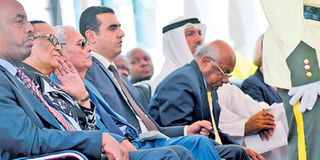Non-alignment to remain key in TZ foreign policy

Envoys follow the proceedings during the event to commemorate the United Nation’s 71st anniversary in Dar es Salaam yesterday. PHOTO|STATE HOUSE
What you need to know:
- Addressing reporters on the sidelines of the commemoration of United Nation’s 71st anniversary in the city yesterday, Dr Mahiga said as it seeks to implement economic diplomacy, Tanzania will use an approach known as principled, pragmatic, constructive engagement.
Dar es Salaam. The principle of non-alignment will continue to be the key in Tanzania’s foreign policy as it seeks to widen the horizons of its diplomatic engagements with the world, the minister for Foreign Affairs and East African Cooperation, Dr Augustine Mahiga, said yesterday.
Addressing reporters on the sidelines of the commemoration of United Nation’s 71st anniversary in the city yesterday, Dr Mahiga said as it seeks to implement economic diplomacy, Tanzania will use an approach known as principled, pragmatic, constructive engagement.
“This approach and the other principles of independence, human dignity, mutual respect and cooperation will enable us to implement more successfully our foreign policy of economic diplomacy,” Dr Mahiga, who is a former Permanent Representative of Tanzania to the UN, said.
Dr Mahiga underscored the country’s foreign policy strategies yesterday as Moroccan King Mohammed VI was in town for a three-day official visit.
The visit has raised questions over whether Tanzania’s long standing support for Western Sahara, which is forcefully being occupied by Morocco, has changed.
Tanzania’s foreign policy, which was adopted in 2001 embraces the concept of Economic Diplomacy which is the process through which countries engage the outside world to maximise their national gain in all economic fields.
Challenges abound in Tanzania’s implementation of the economic diplomacy, though. The Controller and Auditor General Audit report for 2014/15 found out that the country’s diplomatic service still don’t have adequately and appropriately skilled personnel to effectively implement economic diplomacy.
The CAG also said that the government has not leveraged economic and commercial expertise in various departments and in the business sector in order to beef up its economic diplomacy capacity.
“There is a need to have staff with competency in trade, investment and tourism promotion, technology transfers as well as global economic governance to explore advantages of diplomatic missions,” the report, issued earlier, this year said.




